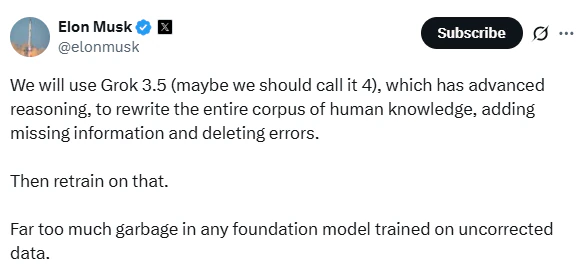
"We will use Grok 3.5 (perhaps we should call it 4), equipped with advanced reasoning, to rewrite the entire body of human knowledge, adding missing information and correcting errors. Next, we will re-train the model on this improved data. There is too much garbage in any model trained on faulty data." Elon Musk's latest controversial statement concerns a very sensitive topic and field like artificial intelligence with experts now constantly seesawing about the risks and benefits offered by the extraordinary power of data analysis and reprocessing.
For the entrepreneur, a former Trump adviser, one of the main problems with generative artificial intelligence lies in the data with which it is trained. Musk argues that this data is not simply “incorrigible,” but often represents real “junk.” That is why in the post he announced a kind of knowledge rewrite. The data used to train generative AIs comes largely from content available online.
In Grok's case, one can also draw on the wealth of posts shared on X, formerly Twitter, owned by Musk himself. However, Musk believes this information is not suitable for training because it contains too many errors, although he does not specify what these errors are: is he referring to personal opinions, biased interpretations of facts, or both? His idea is to create a database of facts considered divisive, to improve Grok's training, including items that are politically incorrect but, according to Musk, nonetheless “factually true.”
This series of statements comes after a series of attacks aimed specifically at ChatGPT, the most widely used chatbot, which Musk accuses of being trained to provide “drugged” responses from a culture woke. Some critics point out that Grok has many issues, not only because of the data with which he was trained, but also because of suspected outside interventions that have tried to correct his responses. In particular, it is suspected that “human” modifications have been made to the AI's responses on sensitive topics, such as the U.S. election or alleged white genocide in South Africa.
Among the responses we find to the post by the patron of Tesla, SpaceX and Neuralink is one from Gary Marcus, professor emeritus at New York University, who likens Musk's idea to an Orwellian dystopia: "Straight out of 1984. You can't align Grok with his personal beliefs, so you want to rewrite history to make it confirm your vision."
 hiveblocks
hiveblocks